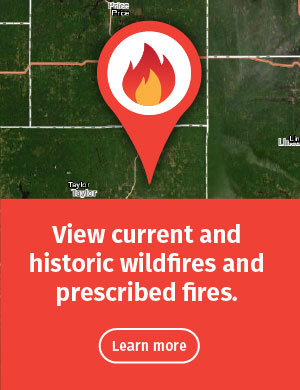Wildland Firefighter Employment
Do you have a love for the outdoors, a healthy thirst for adventure and enjoy a mix of work in the office and in the field? There are a variety of jobs at the federal, state, local level—as well as in non-governmental organizations (NGOs) and private entities—that provide the opportunity to protect and manage our forests and wild places. If this dynamic field interests you, it's never too early to start planning your career.
Wildland firefighter backgrounds
Having a well-rounded understanding of fire-impacted ecosystems is a crucial component of a wildland fire career. Wildland firefighters come from an assortment of disciplines, often having academic and professional knowledge in a wide variety of topics.
An understanding of how forests regenerate, thrive and transition over time is garnered from experience in forestry and silviculture. Knowledge of forest health provides insights into invasive species and other forest pests, their impacts on tree species and habitat communities and also indicates how likely impacted habitats are to burn. Forest and range habitats are highly linked to soil types and geological influences, so some wildland firefighters study soil science and geoscience.
Being able to predict fire behavior and map the trajectory of a fire requires an understanding of meteorology and Geographic Information Systems (GIS). Recognizing the value of prescribed fire on various wildlife habitats requires a strong understanding of biology. Even sociology comes into play, in recognizing the critical components of fire prevention for people living in the Wildland Urban Interface (WUI).
Education
While you're in high school, take lots of science, math and English classes. Most professional foresters and wildland firefighters have a minimum of a bachelor's degree in a related field. Many also have a master's degree. In addition to providing the coursework required for your degree, universities and community colleges sometimes offer the opportunity to be part of a fire crew.
Experience
If you have no prior involvement in wildland firefighting, there are often classes available at your local university, technical or community college that could increase your basic understanding of fire science. Volunteering for your local fire department may give you field experience in fighting wildland fires, as well as invaluable training and networking opportunities. In many cases, colleges can also direct students to seasonal wildland fire or fuels jobs to help gain invaluable experience.
Helpful courses
- S-130: Firefighter Training
- S-190: Introduction to Wildland Fire Behavior
- L-180: Human Factors in the Wildland Fire Service
- IS-800: National Response Framework, An Introduction
- IS-700: National Incident Management System (NIMS): An Introduction
- Basic First Aid Training
Physical fitness
Hauling heavy fire equipment, laying hose and digging fireline can be grueling work. Federal, state and local agencies often have minimum physical fitness standards that must be met in order to work on the fireline.
Wisconsin requirements
Wisconsin wildland firefighters currently must meet the moderate level "work capacity test." This physical fitness standard entails walking two miles while wearing a twenty-five pound pack in under thirty minutes.
National requirements
At the national level, the physical fitness standard, known as the "pack test," requires walking three miles while wearing a forty-five pound pack, in forty-five minutes or less.
Career information and opportunities
Some job offerings in wildland fire are seasonal, some are limited term and others are full-time. The duration of the commitment is usually commensurate with experience.
In Wisconsin, foresters and forestry technicians hold the majority of our wildland firefighting responsibilities, in addition to conducting forestry field work and administrating forestry practices. Information on these career opportunities can be found on the Wisconsin DNR employment opportunities page.
Within the federal government, the following agencies all hire experienced and entry-level wildland firefighters.
- U.S. Forest Service
- The Bureau of Land Management
- National Park Service
- Bureau of Indian Affairs
- U.S. Fish and Wildlife Service
For an all-encompassing Federal listing of opportunities, please visit USAJOBS.gov [exit DNR]. Some helpful search keywords include wildland fire, forester, forestry technician and range technician.

